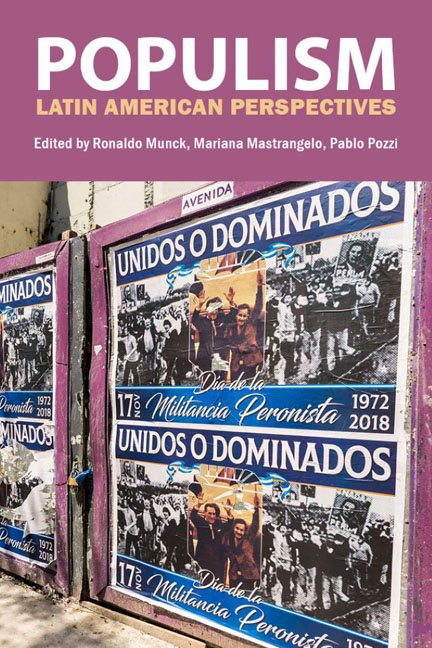Book contents
- Frontmatter
- Contents
- Abbreviations and acronyms
- Foreword
- Introduction
- 1 Populism in Latin America: development, democracy and social transformation
- 2 Peronism in Argentina: left or right?
- 3 The populist left in Chile: socialists and communists from 1936 to 1973
- 4 The left and the Workers’ Party in Brazil: a party between populism, social policies and the popular vote
- 5 Brazil, Bolsonaro and populism of the right
- 6 Political dilemmas of the government of López Obrador: between populism, democracy and the left in Mexico
- 7 The Bolivarian process in Venezuela: socialism, populism or neoliberalism?
- 8 Populist responses to crises of market democracy: the case of Bolivia’s Evo Morales
- 9 Ecuador: populism and the 2007– 17 political cycle
- 10 The Nicaraguan crisis and the mirage of left populism
- 11 Populism and the right in Latin America
- 12 Populism and the left in Latin America
- Afterword: a tale of two “people”: national popular and twenty-first-century Latin American populisms
- Contributors
- Index
Foreword
Published online by Cambridge University Press: 23 January 2024
- Frontmatter
- Contents
- Abbreviations and acronyms
- Foreword
- Introduction
- 1 Populism in Latin America: development, democracy and social transformation
- 2 Peronism in Argentina: left or right?
- 3 The populist left in Chile: socialists and communists from 1936 to 1973
- 4 The left and the Workers’ Party in Brazil: a party between populism, social policies and the popular vote
- 5 Brazil, Bolsonaro and populism of the right
- 6 Political dilemmas of the government of López Obrador: between populism, democracy and the left in Mexico
- 7 The Bolivarian process in Venezuela: socialism, populism or neoliberalism?
- 8 Populist responses to crises of market democracy: the case of Bolivia’s Evo Morales
- 9 Ecuador: populism and the 2007– 17 political cycle
- 10 The Nicaraguan crisis and the mirage of left populism
- 11 Populism and the right in Latin America
- 12 Populism and the left in Latin America
- Afterword: a tale of two “people”: national popular and twenty-first-century Latin American populisms
- Contributors
- Index
Summary
The value of this book is, above all, in its erudite restatement of the centrality of Latin America to the theorization of populism and, by implication, representation, citizenship and the state. That the region does not occupy a more important position within the sociological literature on populism, citizenship and the state, and is not used more widely as the basis for comparative social theory, is a frank mystery – and one this book sets out to challenge. The fault lies with longstanding biases in social science that mean Latin American states and societies are more frequently studied for what they fail to be, instead of what they are. There is little point imagining Latin American states will behave like European ones since they emerged from quite different social and political circumstances, have different levels of capacity, and face different dilemmas. But, instead of probing these differences analytically, Latin America so often finds itself shoehorned into social and political theories that render it, almost inevitably, failing and deviant. And even when the region offers rich, complex, multifaceted histories of important political phenomena that could serve as the starting point for wider theoretical debate – as with populism – its vital contribution is still all too easily side-lined or bolted awkwardly onto theories driven by Anglophone and European narratives. In the case of populism, this really is a huge opportunity lost, since on this particular subject, Latin America is a gift that keeps on giving, as this admirable set of studies makes abundantly clear.
All experiments in populist politics begin with grievances of citizens or subjects who think they deserve better from government. It should not come as a surprise, therefore, that one important contribution of this collection stems from the set of essays that explores populism as the expression of those grievances within the context of the Latin American left. Emphasizing the roots of populism as – at least at times – a vehicle for progressive social demands, stands in refreshing contrast to the contemporary emphasis, in the media and European scholarship especially, on populism as the expression of radical right politics and the rise of chauvinism, racism, xenophobia and extreme, and frequently gendered, law and order programmes of social control.
- Type
- Chapter
- Information
- PopulismLatin American Perspectives, pp. xi - xivPublisher: Agenda PublishingPrint publication year: 2023

